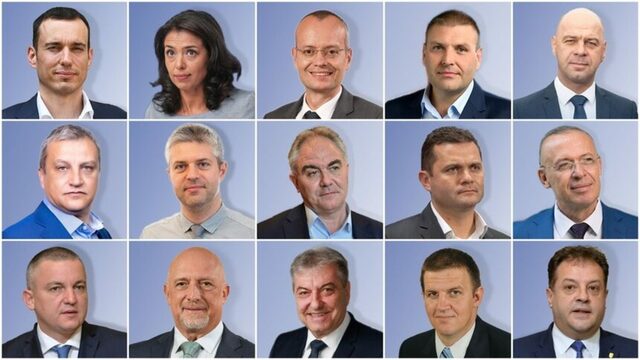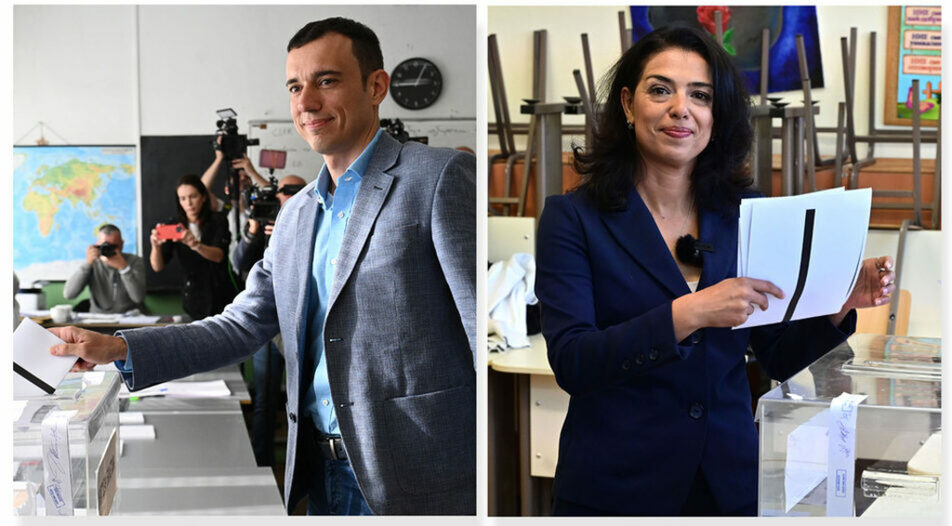The reformist candidate for mayor of Sofia - IT entrepreneur Vassil Terziev - wins the runoff in the capital by fewer than 5,000 votes against trade unionist Vanya Grigorova. GERB loses Varna and Blagoevgrad, but wins Pleven, which will all have new mayors. There will be a change of the long-standing guard in Kyustendil and Pazardzhik, but also another mandate for the incumbents in Ruse (BSP), Veliko Tarnovo, Haskovo and Smolyan (all GERB) - these are the main takeaways of the second round of mayoral elections on November 5.
The post-election picture is complicated, but the main conclusions are the following: Outside the loss of key cities, Boyko Borissov's party has retained its dominance in most municipal councils, but even as the first political force in them it is becoming more and more dependent on others to form a majority.
Against this backdrop, their main opponents from the "non-coalition," WCC-DB, scored some key successes but failed to generate the wave of change they expected anywhere. The dwindling mobilization among WCC-DB voters stems from weak local structures, infighting with the other governing parties and an indifferent electoral campaign. So the answer to the next important question for the reformists - whether they would regain voter confidence - will depend on their actions in the localities they win or where they have to work with GERB.
Most of the clashes in the 19 regional towns where no mayor was elected last week were between the two political forces in the country's government, GERB and WCC-DB, and this has soured their relations. Even before the ballot, the GERB leader had threatened to withdraw his support for the cabinet, then accused the WCC-DB of conspiring against his party in the runoffs. Even on election day itself he talked about rigging of the machines in Sofia and Varna.
What happened in Sofia?
The exit polls showed that the candidate of the United for Sofia coalition of WCC-DB, Save Sofia and Team Sofia, Vassil Terziev, was the undisputed new mayor of Sofia with almost 50% of the votes. And just like in the first round, during the parallel counting later on, the 6% gap between him and leftist Vanya Grigorova started to melt. By 22:00, according to different data from Gallup and Alpha Research - to about 2 percentage points. Thus, until the final vote count data, the result in Sofia remains in the balance.
Combined with the low voter turnout, which will likely be below 35%, this development clearly shows that Terziev was backed only by the most hardcore voters of the coalition after a campaign which focused on his family's links to the former Communist-era State Security apparatus. It seems that GERB also deserves "credit" for what happened in the capital. Before the second round in Sofia, Borissov announced that Grigorova was the better candidate, then said he was joking and at the last moment said he would "unwillingly" support his governing partner's candidate. The mixed messages affected his supporters - Alpha Research's exit polls in Sofia show that 46% of those who voted in the first round for GERB candidate Anton Hekimyan supported Grigorova in the runoff, against 38% who voted for Terziev.
Around the country

The final results of the local elections may bring symbolic losses for Borissov's party, which, although it retained formal positions in some of the municipalities, seems to be losing the mayoral positions in Varna and Blagoevgrad and Pazardzhik, where it has long worked with the local mayor. In Shumen, Borissov lost to BSP, while in Lovech it looks like the candidate of Bulgarian Rise and TISP - Stratimir Petkov - won. All of this seriously shakes the position of GERB, which until now prided itself on its stability in local government.
According to the exit polls, confirmed throughout the evening and by parallel counts, it looks like GERB is losing the mayoralty in Varna, where Ivan Portnih has been the city's unchallenged mayor for 10 years and has become a symbol of mismanagement and corruption. According to preliminary data from Market Links, the WCC-DB candidate Blagomir Kotsev won the vote with 48.5% against 43.9% for Portnih.
The battle for Blagoevgrad, where the candidates of GERB and WCC-DB are about 2% apart, also looked close until the end. At the beginning of the election night, according to the exit polls, Ilko Stoyanov (GERB) was leading over Metodi Baikushev. However, the picture was reversed and Baikushev won with 50,2% to 47,24.
Pazardzhik is another symbolic place for GERB in which it seems the formation will concede to WCC-DB. Although formally nominated by a local party and backed by Borissov, the town's long-time mayor Todor Popov lost to WCC-DB's Petar Kulinski by 44% to 54%.
GERB retained its dominance in nearby Plovdiv, however, where Kostadin Dimitrov was elected mayor with 51.5% against WCC-DB's Ivaylo Staribratov, who had just over 41% of the votes. GERB's victory was far from unchallenged, because in Bulgaria's second-largest city the turnout was only 21%. This almost amounts to a boycott by the majority of voters. It also won Pleven, where Valentin Hristov beat incumbent mayor Georg Spartanski, Veliko Tarnovo, where Daniel Panov leads with 10% to Yordan Terziyski from WCC-DB, as well as Haskovo.
Outside of Sofia, BSP had little to brag about - the party's nominees won the ballot in Ruse, where the incumbent mayor Pencho Milkov (BSP) has a lead of more than 10 points over GERB candidate Ivan Ivanov. The left-wing candidate in Shumen, Hristo Hristov, won the mayor's seat ahead of GERB candidate Georgi Kolev.
Is the "assembly" going to fall?
Against this backdrop, GERB leader Boyko Borissov has demanded a reformulation of the ruling coalition. From Plovdiv, where his party won decisively (yet on an even lower turnout of about 21%), he announced that on Wednesday, there will be a party forum of GERB, to discuss whether and how to continue the joint government, mockingly called "the assembly" by the GERB leader. Borissov cited the cooperation of WCC-DB with opposition parties in some of the municipalities where the formations faced off GERB in the runoff. Another gripe was Prime Minister Nikolay Denkov's demand to replace the head of the National Security Agency DANS without consulting him. And also that Assen Vassilev introduced tax laws without having coordinated them with GERB.
Overall, the second round of the elections was marred by more of the same problems that shook the first round - turnout that was so low in some places that, combined with the continuously huge amount of invalid ballots and blocked machine voting, is casting doubts over the general legitimacy of the vote.
The reformist candidate for mayor of Sofia - IT entrepreneur Vassil Terziev - wins the runoff in the capital by fewer than 5,000 votes against trade unionist Vanya Grigorova. GERB loses Varna and Blagoevgrad, but wins Pleven, which will all have new mayors. There will be a change of the long-standing guard in Kyustendil and Pazardzhik, but also another mandate for the incumbents in Ruse (BSP), Veliko Tarnovo, Haskovo and Smolyan (all GERB) - these are the main takeaways of the second round of mayoral elections on November 5.
The post-election picture is complicated, but the main conclusions are the following: Outside the loss of key cities, Boyko Borissov's party has retained its dominance in most municipal councils, but even as the first political force in them it is becoming more and more dependent on others to form a majority.












